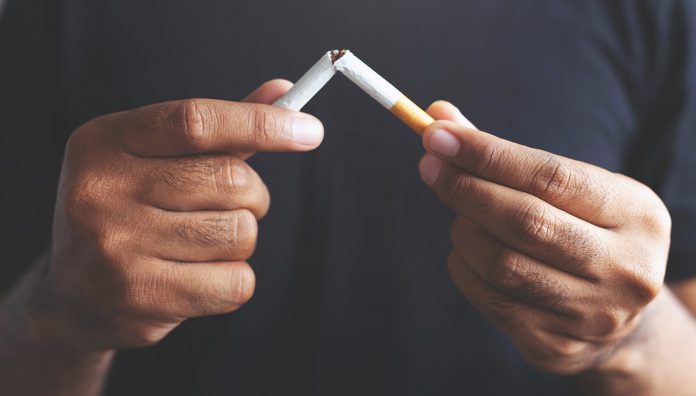Quitting smoking is more important than ever, with a new study finding people who smoke are 1.4 times more likely to have severe symptoms of COVID-19 and about 2.4 times more likely to be admitted to an intensive care unit, need mechanical ventilation or die compared to non-smokers.
Dr Jacinta Johnson MPS, lecturer in pharmacy at the University of South Australia, said pharmacists were well placed to provide evidence-based support and information for those looking to quit the habit, particularly at a time of increased stress.
‘Although nicotine replacement therapy (NRT) can just be selected off the shelf, or even from supermarkets, those using it require advice and further support for it to really be effective,’ she told Australian Pharmacist.
‘Pharmacists can also directly refer people to Quitline (13 78 48) for information and support from a trained and experienced counsellor.
‘Stress is a really common trigger for relapse to smoking too, so now more than ever it is important to check in with your patients and ensure they’re receiving the support they need.’
Dr Johnson added that pharmacists have the knowledge and skills to undertake assessments, provide tailored advice around NRT and to counsel to ensure correct use, optimising how effective the replacement therapy will be.
This is particularly important as a significant challenge of NRT is that people rarely use enough nicotine to properly suppress cravings.
‘There are lots of myths around quitting out there; as pharmacists we can really add value to smoking cessation conversations because people know the information and advice we provide is reliable and can be trusted,’ she said.
A desire to quit
Anecdotally, some community pharmacists are reporting a slight increase in customers looking to quit smoking.

Clare Anderson MPS, managing pharmacist at King Island Pharmacy off the coast of Tasmania, said they had dispensed nine Champix starter packs so far this year in a community of 1,500, compared to five at the same time last year.
‘My approach to helping quitting is to remind people to focus on the why, put the money they would have spent on cigarettes aside as an incentive and not beat themselves up too much over slip-ups,’ she said.
Ms Anderson also said that with the cost advantages of NRT on prescription, she refers more people to their GP than she used to.
When it comes to COVID-19, she has also seen a spike in people buying asthma preventers, but fears that complacency in the population may be starting to set in.
‘There were more people thinking about quitting when COVID issues started, but now the whole island is locked down and we have had no cases, the urgency to change has stopped as people have relaxed,’ she said.
Focus on the benefits
Dr Johnson said it is important to remember the huge health benefits gained when someone quits smoking, and that pharmacists should keep this in mind when prioritising activities in the pharmacy.
‘We often know which members of the community have coexisting health concerns that make smoking cessation even more important,’ she said.
‘We should be taking every opportunity to ask about tobacco use and determine readiness for change.’
The frequency of visits to the pharmacy, especially as an essential service during the pandemic lockdown period, means that pharmacists are also perfectly placed to provide follow-up support throughout the quitting process.
‘We can check in with those who are quitting to provide positive reinforcement and encouragement, and to provide further tips or recommended changes in pharmacological support as needed to maximise the chance of long-term success,’ she said.
‘Offering ongoing support can also help by increasing accountability for the person who is quitting, and that can be really powerful.’



 Professor Margie Danchin[/caption]
Professor Margie Danchin[/caption]

 Dr Peter Tenni[/caption]
Dr Peter Tenni[/caption]
 How should we deprescribe gabapentinoids, according to the Maudsley Deprescribing Guidelines[/caption]
How should we deprescribe gabapentinoids, according to the Maudsley Deprescribing Guidelines[/caption]



 Pharmacists have always prescribed, but they have the potential to prescribe much more
Pharmacists have always prescribed, but they have the potential to prescribe much more




